Kelly Reichardt does not go easy on her characters. Or her actors, for that matter. Audiences, accustomed to much more in terms of plot, resolution and the blatantly obvious, might well count themselves among the ill-used after sitting through one of Ms. Reichardt's half dozen feature films. All the same, the uncompromising Reichardt continues to solidify her place among the best American writers and directors. The three main characters in her latest film, the certain women in question, must take their small satisfactions where they can find them. For those of us watching the proceedings, there is 107 minutes of beauty and subtlety, the like of which one could hardly find elsewhere. I could have watched this film had it extended hours beyond its appointed running time.
As she is wont to do, Kelly Reichardt expanded upon short stories in creating her latest film, Certain Woman. The stories in this case drawn from collections by Montana native Maile Meloy. The three stories adapted for Certain Women are from Meloy's Half in Love (2002) and Both Ways is the Only Way I Want It (2009), titles whose ambivalence strike a harmony with most of Reichardt's work. Or perhaps a common discord. Either way, Reichardt found herself a kindred spirit in the Montana native.
The natural world is usually not far from Ms. Reichardt's restless characters and lean stories. In this case, the Montana landscape itself presides impassively in its otherworldly beauty. It also has every potential to isolate, as it does for one of those main characters, Jamie (Lily Gladstone), a young ranch hand working through a lonely winter job seeing to horses in the eastern extreme of the vast state.
Much as we are never long removed from the Montana landscape, by day or night in Certain Women, the director gave herself the task of working more on interior shooting. The most striking example occurs in the film's first scene (of action). A woman and a man are dressing after a lunchtime tryst. We see the legs of the woman, Laura Wells (Laura Dern) still in bed, working panties back in place (have there been many more expressive sets of legs in film history than the long, skinny limbs of Laura Dern?). Simultaneously, to her right, separated by a rather meaningful section of wall, we see a man, Ryan Lewis, (James LeGros) standing, pulling a long john top over his head. There's little sense of romance or even excited (sated) lust in this aftermath, but our friend with the great, wiry growth of gray beard makes sure there's no air left in the the balloon when he says, "I thought you had to be back at work."

The pleasures are fleeting for the trio of women featured in Certain Women. There's always the tug of practicality, the call of a job. In the case of Laura Wells, that job is of local lawyer. When she returns to her office after the non-lunch lunch, she's met by the client that won't end, William Fuller (Jared Harris).
Fuller has been out of work for months after a construction accident left him, with among other disabilities, compromised vision ("the lines are all squiggly" he says in response to Laura's wearied advice to "...go to the library. Read a book." after Fuller admits that his wife wants him out of the house). The former construction worker has no claim against his former employer since he accepted a small settlement after the accident. This a clear-cut legal opinion that the aggrieved man will in no way accept from Laura. When she arranges for a second opinion with a personal injury lawyer in Billings and he confirms her appraisal, Fuller accepts it with a resigned "Okay." "It would be so lovely to think that if I were a man and I could explain the law and people would listen and say okay," Laura says into her cell phone from a mall parking lot in Billings.
The person at the other end of the virtual wire is Mr. Lewis, he of the lunchtime roll in the hay. Laura's attempt to find some consolation is cut short by her indifferent lover, deciding that he needs to end the affair. Typical of Reichardt, this occurs not amidst the bang of recriminations, but with a whimper. "I just think maybe, I have my hands full," the man says. "Um look, I've gotta go," says Laura, hardly devastated. Or perhaps she's just distracted. Her personal albatross, Fuller, is homing toward her car after being unceremoniously ejected from his wife's vehicle. All of this our beleaguered lawyer faces by midday. And yet, the day and night ahead hold more absurdity and thankless work for the put-upon woman.
It's when Certain Women's roundabout arrives at the third of its lonely or longing women that it finds its most mesmerizing portrait. This the aforementioned Jamie, the young woman laboring through a solitary winter's job, attending to horses at a rural barn and living in a spare room at the facility. Her loneliness sends her off into the expansive darkness one night in a pickup truck. In the nearest town, she sees a few cars pulling into a school parking lot. Lacking anything more satisfying to do, she follows a small group into the building and takes a seat at the back of a classroom. This, she finds out, is some sort of course in educational law taught by an unsure, not at all thrilled to be there recent law school graduate by the name of Beth Travis (Kristen Stewart). Jamie, on the other hand, is very pleased that Beth is there. It's immediately obvious she's smitten with the reluctant teacher.
The second time we see the young lawyer, she does the rounds in her modest classroom in a gold sweater vest over a white long-sleeved top. There's such an unfashionable eloquence in this ensemble that it's as close as Certain Women gets to overstatement. Beth later expands upon her still tenuous financial position, actual or merely perceived, when explaining to Jamie in a local diner after class why she is making the almost impossible four-hour commute twice a week, which leaves little time for sleep on the class nights: "I was so afraid I would get out of law school and be sellin' shoes. My mom works in a school cafeteria, my sister in a hospital laundry. So, selling shoes is the nicest job a girl in my family is supposed to get."
The few evening classes where Jamie gets to see Beth - and it's quite clear the object of her affection could be expounding upon educational law, Euclidean geometry, or the practical uses of cow manure without any loss of interest on the part of the rapt woman at the back of the classroom - are oases in her otherwise arid existence.
With repeated instead of protracted scenes, Reichardt demonstrates the routines that are Jamie's life. Several times we see the barn door whisked open of a morning. On each occasion, there is a grand Montana peak in the background, the opening a kind of curtain rising, something of a revelation. Jamie's charges are usually waiting for that barn door to slide open, as is the furry Roomba of a dog that follows her, particularly as she rides a tractor across a snowy pasture to distribute bales of hay. At one unveiling of the day, we see a dark-hided horse approach the entry, snow upon its back. The detail, the grain of the snow is discernible against the black skin, as are the subtle variations in color of the landscape beyond, because Reichardt and cinematographer Christopher Blauvelt chose to photograph Certain Women in 16mm, not on digital film as originally planned. Too much detail would be lost, the director realized not long into pre-production. A typically uncompromising decision on the part of Kelly Reichardt.
Surprisingly, the slightest of three lives observed in Certain Women is that of Gina Lewis. Whether this is simply a matter of time devoted to the character or the fact that there's not a great deal to reveal isn't immediately obvious. The surprise is that Gina is played by a seemingly underutilized Michelle Williams, who starred in Reichardt's Wendy and Lucy (2008) and Meek's Cutoff (2010). It might be the case that this is the character Reichardt was least interested in exploring, revealing. But even in this most elliptical of the three interspersed segments in Certain Women, the writer and director refuses to resort to a pat characterization.
 We don't know Gina's profession, much as she is the main source of income in her family. This much is owned by husband Ryan, while speaking to their disaffected teenage daughter while Gina is out of earshot:
We don't know Gina's profession, much as she is the main source of income in her family. This much is owned by husband Ryan, while speaking to their disaffected teenage daughter while Gina is out of earshot:
"Listen. Let's you and I make an effort today. We're gonna be nice to your mom today, okay? Let's cut her some slack."
"Why? Is she sick or something." (This the indifferent Guthrie Lewis)
"No, she isn't sick....Because neither one of us would do very well without her."
The husband is the same man we saw in the the earlier scene, obviously finishing an affair with Laura Wells. This, along with Jamie's later appearance at Laura's law office, searching for Beth, the only common threads in the otherwise loose weave of Certain Women.
Much as Laura Wells and Beth Travis are lawyers, Gina Lewis, regardless of profession, is the odd woman out in the story and on the Montana landscape. We first see her in a navy jacket and Lyrca pants, hair neatly and obediently pulled back, an elfin alien pacing through the sere winter grass and scrub brush. She's very well put together for someone who just finished a run, but a somewhat guilty cigarette reveals that her communing with nature didn't dispel all the anxiety of a life of ambition. One of Beth's ambitions is to build a house on the site where she and her family are camping. Toward that end, she hopes to acquire a load of sandstone that rests on and in the land of the solitary Albert (Rene Auberjonois).
Gina and Ryan's visit to Albert expresses much more than the pathos of a man living alone at the end of his life, attention and memory coming and going. Both in Albert's home and in the couple's subsequent drive home, we see some of the good and bad in both Gina and Ryan, not to mention the obvious fissures in their relationship. When Ryan fails to finesse Albert toward agreeing to sell or give them outright the sandstone, at least to Gina's satisfaction, she shares her frustration when they're back on the road: "God, you really weren't helping me at all."
Gina gets the coveted sandstone. It could well be a symbol by which a storyteller, a director, mocks the woman, dismissing her as yuppie striving for an authenticity about which she has no idea, to which she has no right. But slight as both this character and portion of Certain Women would seem to be, both Kelly Reichardt and Michelle Williams are interested in expressing or at least suggesting all the humanity present. We last see Gina, drinking a cup of coffee and regarding the pile of relocated stone. This might be about as good as it gets for the driven woman, but there's enough repose to suggest a soul where a less compassionate view would suggest none.
Kelly Reichard's films are full of moments of repose, of revelation. They are not, however, replete with laughter. Like the five features that preceded it, Certain Women will not be mistaken for a comedy of any sort. And yet, there are small moments of absurdity, especially in the travails of Laura. After he gets confirmation that he has no claim against his former employer, Fuller breaks into an office building where his case files are housed and takes a security guard hostage. Haunting her even into her sleep, Fuller's exploits drag Laura from her bed when the police call her to the scene. Before she quite knows what's going on, she's on her way into the building to reason with her client. The fleeting moment of disbelief we see Laura Dern's face as she fits her clothes over a Kevlar vest perfectly express the absurdity of the situation and her relationship with Fuller. A quieter moment of incongruity had occurred earlier in the day, when Laura was eating lunch in a mall food court to escape her ubiquitous client, waiting in the car. She looks with an expression somewhere between bemusement and confusion as a Native American in full ceremonial costume waits in line at an Asian buffet.
The Native American presence in Certain Women is subtle, but perhaps not without significance. Aside from her first feature, River of Grass, all of Kelly Reichardt's films have been set in the west, mainly the Pacific Northwest, Meek's Cutoff, the most blatantly "Western" of them all. There emerged, perhaps by the second or third wave of Westerns in film history, a theme of the disappearing West, as if the American West was the first West, a kind of lost or vanishing Eden. One sees this in the films of Sam Peckinpah, among many others. It's usually white men leading this mourning. But peer through the scrim of encroached-upon wide-open spaces, and behind it's usually Sam or whomever else they mourn for.
Kelly Reichardt notions of place, of West, are more subtle, more complex. There's almost no stridency in her work, but the film's nearly static first scene would seem to bear its messages. At first there is simply a Montana landscape, of such dimension and almost infinite shadings of beauty that it appears to be a painted backdrop. The first sound heard is a Native American rattle (echoed in that mall where Laura eventually sees why the person in ceremonial dress is present). In time, a train whistle is heard and a freight crosses the frame right to left. Again, nothing obvious, nothing strident. But possibly an expression of the impassive, presiding natural world and man's transience. Something too perhaps about an order of arrival.
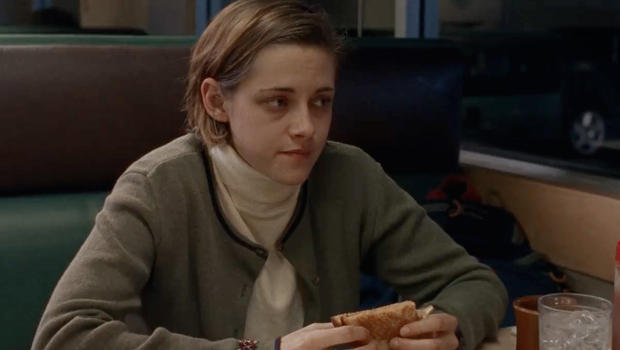 Certain Women's most arresting human presence is Lily Gladstone, herself of Blackfeet and Nez Perce heritage. Ms. Gladstone's simple, luminous beauty is the sort that would likely send Vermeer scrambling for his brushes could the two somehow meet in time and space. Jamie's lineage is not addressed in the film beyond mention of a sister and a childhood spent among horses. The major barrier between the young ranch hand and restive lawyer seems to be neither ethnic background, nor class, but merely desire.
Certain Women's most arresting human presence is Lily Gladstone, herself of Blackfeet and Nez Perce heritage. Ms. Gladstone's simple, luminous beauty is the sort that would likely send Vermeer scrambling for his brushes could the two somehow meet in time and space. Jamie's lineage is not addressed in the film beyond mention of a sister and a childhood spent among horses. The major barrier between the young ranch hand and restive lawyer seems to be neither ethnic background, nor class, but merely desire.
Jamie is allowed one moment of contentment, even joy with Beth. It's also a small moment of rapture for Certain Women. After their second class together, Jamie says that she has a surprise for her teacher. She's come to school on horseback. Beth is offered a ride to the diner and is so nonplussed that she accepts. Here, another moment of absurdity as the clap of hooves is heard on the asphalt of a Montana road and these two women are carried by horseback through the night. But this absurdity of the most lovely and unexpected nature. And very possibly one of the great moments in Jamie's young life. Alas, the would-be romance plays out as the lawyer's reticence has hinted that it will. When Beth finally gives up the class, Jamie makes the four-hour pilgrimage to where she works and lives. Once Beth's place of employment is determined, a parking lot conversation ensues, about as awkward and futile for Jamie as we might expect.
As ever, the weary woman must return to her work, in Jamie's case the the ranch and horses. When she begins to nod off on the interstate, it appears that a much more severe misfortune might be at hand. But this is a Kelly Reichardt film. There's no manufactured drama. Jamie's truck simply veers off the highway, levels a couple of fence posts and slows into the embrace of a field and its dried and browned vegetation, typical of the cold comforts that tend to await these certain women. At the same time, Jamie's unceremonious slide into unconsciousness and the waiting field is met by one of the rare occasions when Certain Women's score (by Jeff Grace) really manifests itself. As if to say, here too is a life of significance.
Maile Meloy's Half in Love is a title consistent with Kelly Reichardt's embrace of ambiguity. It's also very much in the spirit of the give and take of the relationships in Certain Women. In each case - Laura and Ryan; Gina and Ryan; Jamie and Beth - one person seems more interested than the other. One does more of the pursuit while the other seems to have one foot out the door. So it tends to go.
The longing, the loneliness, the sense of dislocation (especially on the part of Jamie) in Certain Women is of a piece with the previous films of Kelly Reichardt, who tends to leave her characters in one sort of limbo or another. There's ample insight and empathy in her stories of Americans past and present. Usually these characters reside beyond the interest of marketers and politicians, but that's not always the case. It might be two men on a strange road trip, as is the case in Old Joy (2006). A vulnerable woman and her dog trying to get to Alaska, as we witness in Wendy in Lucy. A man and woman on the lam in Florida, when they're not really being pursued by anyone (Reichardt referred to it as “a love story without the love, a murder mystery without the murder, a road movie that never gets on the road.”), in the director's first feature, River of Grass (1994).
There is almost always movement in the films of Kelly Reichardt: characters drift toward and away from each other; unsurely in the direction of a goal; or just aimlessly on. The movement itself an expression of our ever unresolved longing. As rendered in the glimpses into the lives of these certain women, there's something deeply satisfying in the identification, in the clear-eyed appraisal. And there is the hush, the images of the land, the valuing of the lives at hand.
You want to go on following the lives of the characters in Certain Women, especially Jamie. Coming back to this beautiful, reflective film will have to suffice. As for the writer and director, you regard the work of this woman and you think, all of that intelligence and subtlety is going to get you absolutely nowhere. And for heaven's sake, don't stop.
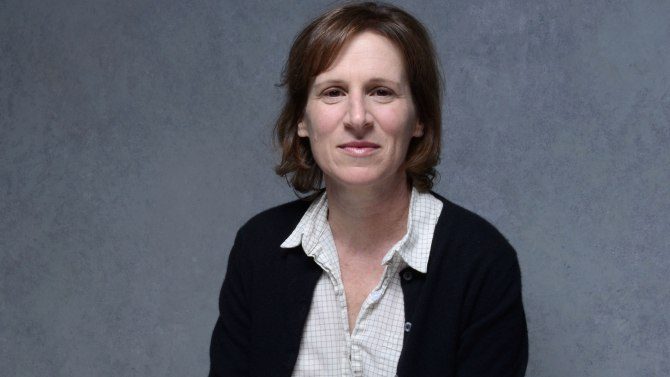 |
| Do you know this woman? You should know this woman. Director Kelly Reichardt. |
db


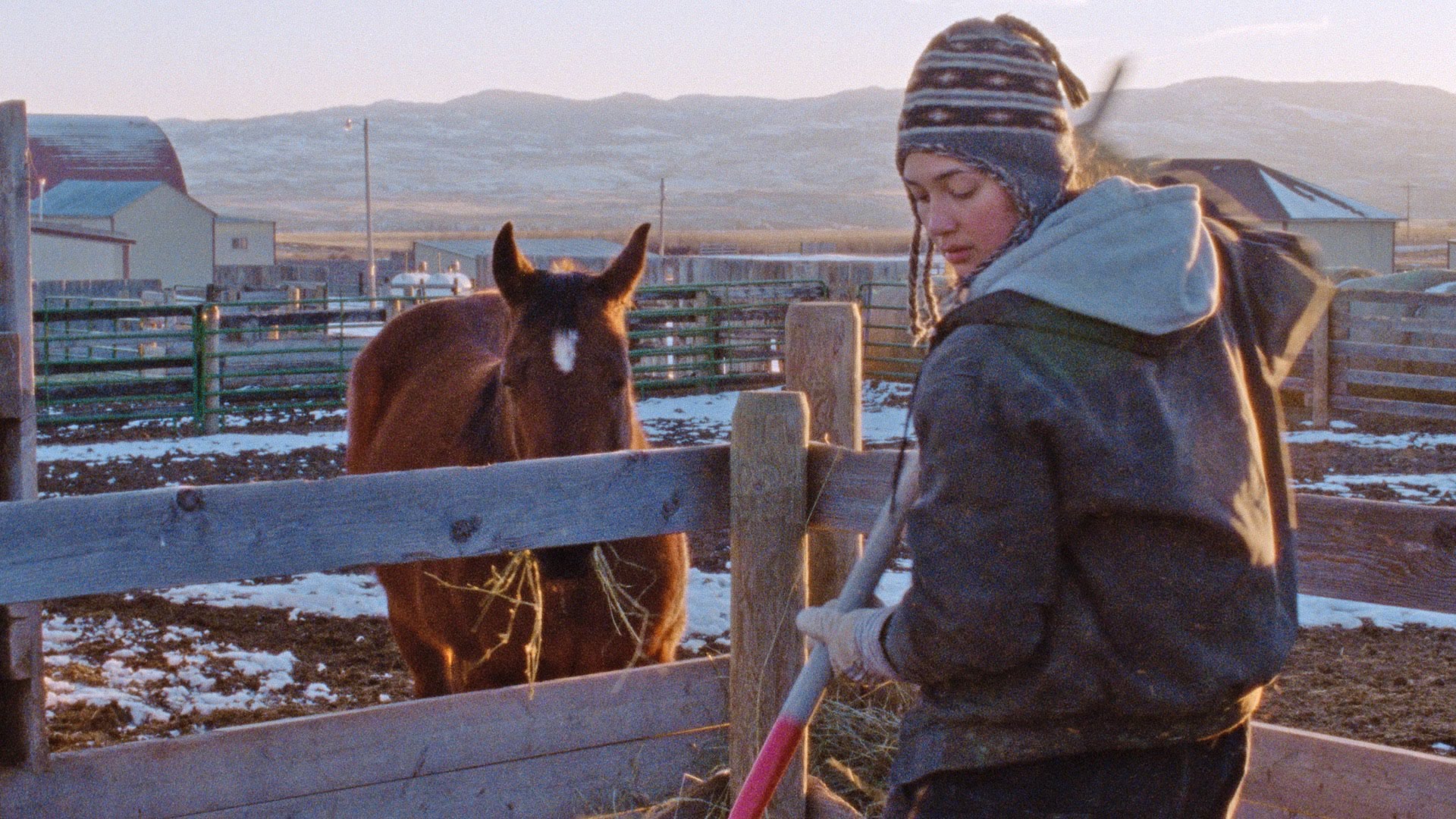

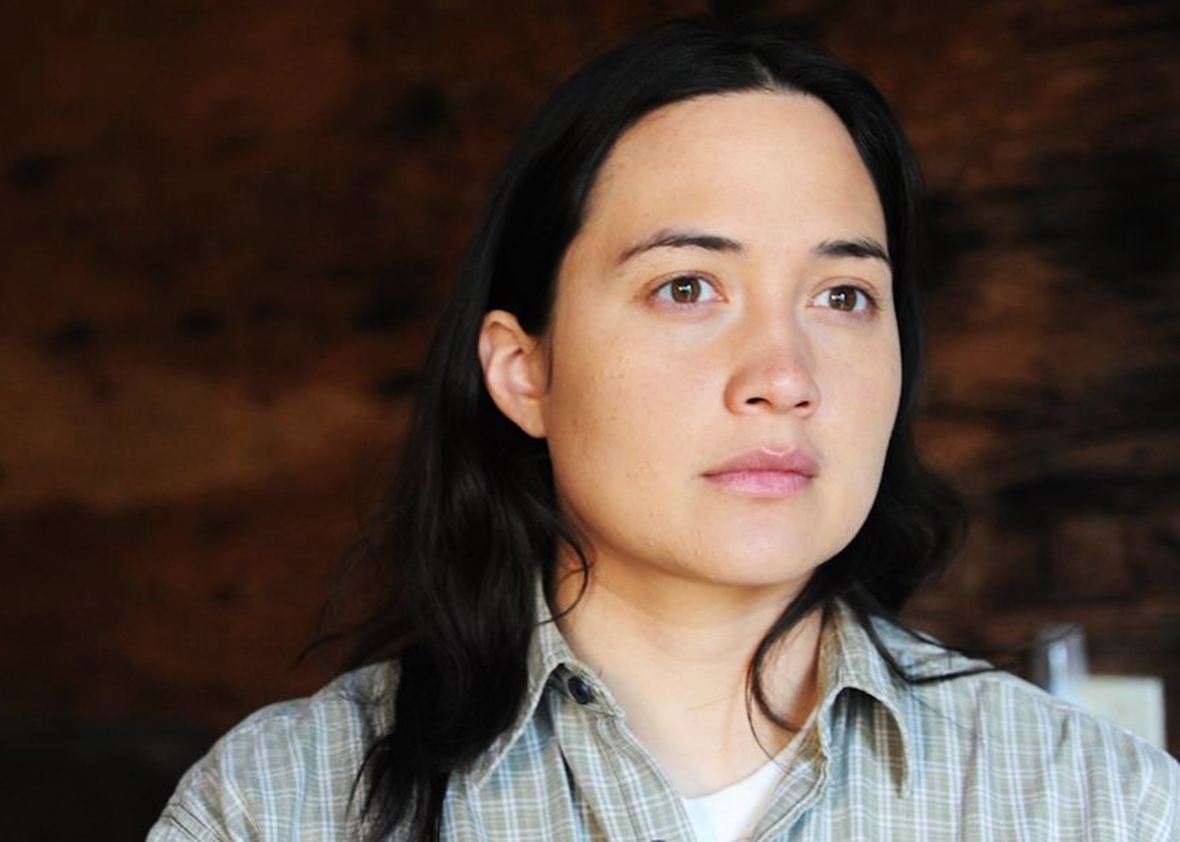
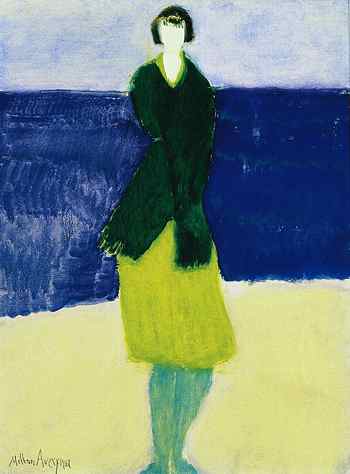


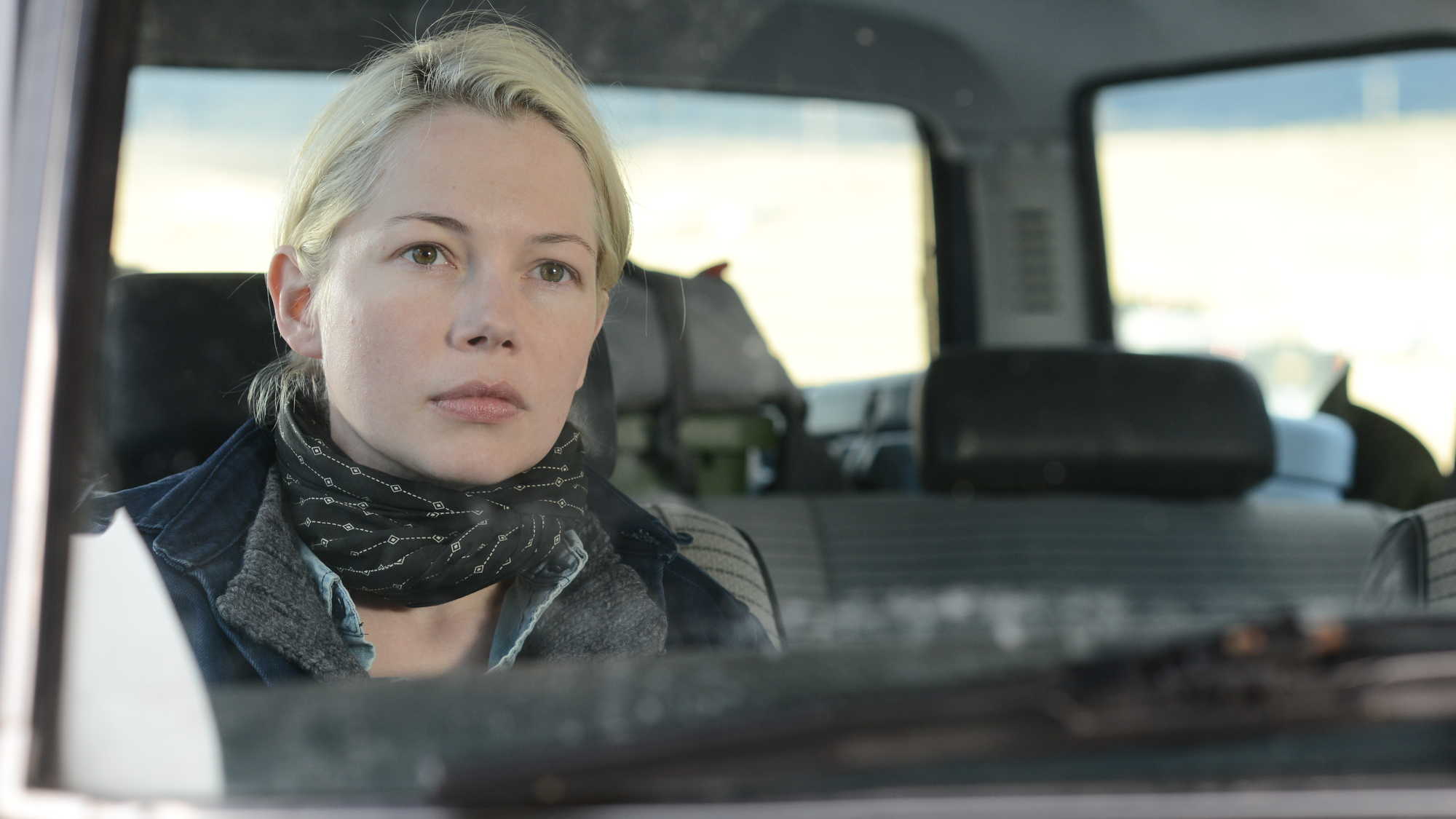


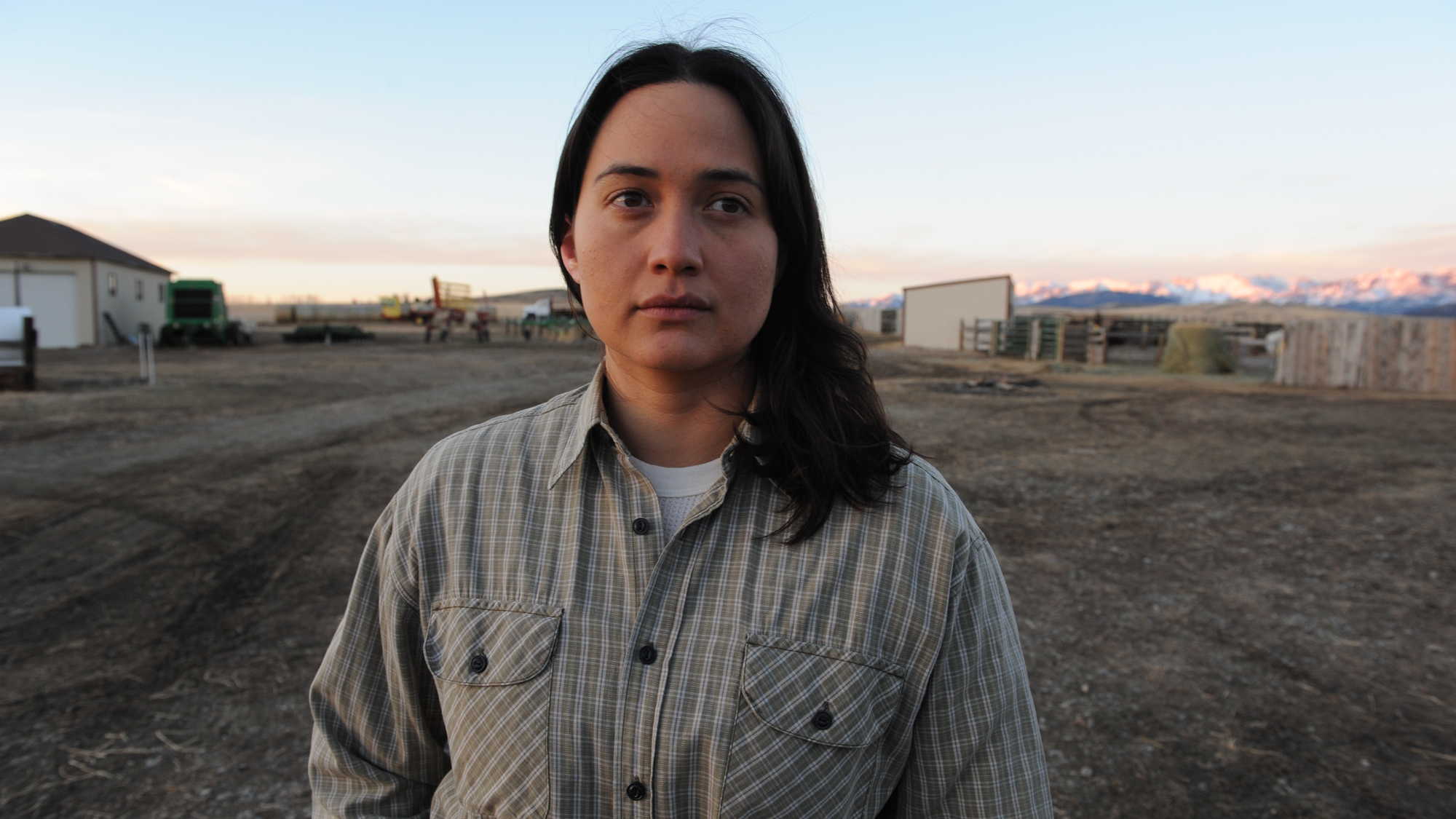
Comments
Post a Comment